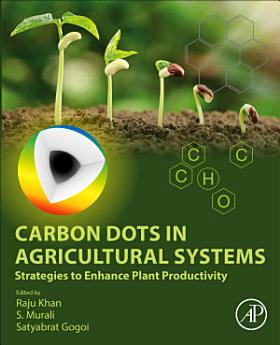Carbon Dots in Agricultural Systems: Strategies to Enhance Plant Productivity
About this ebook
About the author
Raju Khan is a Senior Principal Scientist and Professor, at CSIR-Advanced Materials and Processes Research Institute, Bhopal. He did his PhD in Chemistry in 2005 from Jamia Millia Islamia, Central University, New Delhi, and Postdoctoral researcher at the “Sensor Research Laboratory University of the Western Cape, Cape Town. His current research involved synthesizing novel materials to fabricate electrochemical and fluorescence-based biosensors integrated with microfluidics to detect target disease risk biomarkers for health care monitoring. He has published over 150 papers in SCI journal, which attracted over 5500 citations as per Google Scholar, published 45 book chapters in the reputed book Elsevier and Taylor Francis, editing of 28 books from Elsevier and Taylor Francis, and his research has been highlighted in Nature India. He has supervised 5 PhD and 30 undergraduate/postgraduate theses and has supervised 4 numbers of postdoctoral fellows under the scheme of N-PDF, CSIR-Nehru Fellowship, and DST-Women Scientist Projects.
Professor S. Murali is Senior Principal Scientist at CSIR AMPRI in Bhopal, India
Assistant Professor at The Assam Kaziranga University Jorhat, India. He received his MSc degree in Organic Chemistry from Dibrugarh University and awarded PhD degree in Material Chemistry by Tezpur Central University. He received prestigious National Post-Doctoral Fellowship by SERB-DST, Govt. of India, and carried out his post-doctoral research at CSIR-North East Institute of Science and Technology, Jorhat, India. Dr. Gogoi’s research interest includes nanomaterial synthesis, characterization and their application. He has particular interest on carbonaceous nano-structures like carbon dot, graphene oxide, graphene quantum dots, carbon nanotube for their utility in the domain of sensing, environmental monitoring, bio-imaging, photo-catalysis and energy conversion.






